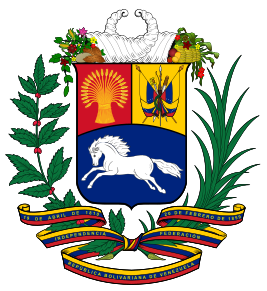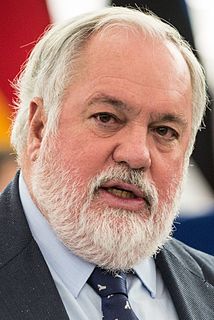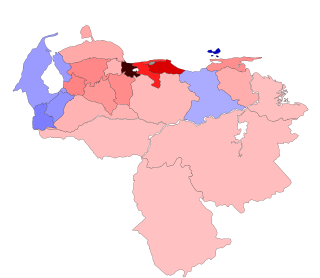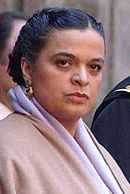
An opinion poll, often simply referred to as a poll or a survey, is a human research survey of public opinion from a particular sample. Opinion polls are usually designed to represent the opinions of a population by conducting a series of questions and then extrapolating generalities in ratio or within confidence intervals.
Parallel voting describes a mixed electoral system where voters in effect participate in two separate elections for a single chamber using different systems, and where the results in one election have little or no impact on the results of the other.

Citizens for Blank Votes is a Spanish political party.

General elections were held in Mexico on Sunday, July 2, 2000.

Elections in Venezuela are held at a national level for the President of Venezuela as head of state and head of government, and for a unicameral legislature. The President of Venezuela is elected for a six-year term by direct election plurality voting, and is eligible for re-election. The National Assembly (Asamblea Nacional) has 165 members (diputados), elected for five-year terms using a mixed member majoritarian system. Elections also take place at state level and local level.

The 1989 Spanish general election was held on Sunday, 29 October 1989, to elect the 4th Cortes Generales of the Kingdom of Spain. All 350 seats in the Congress of Deputies were up for election, as well as 208 of 254 seats in the Senate. An election had not been due until 28 July 1990 at latest, but Prime Minister Felipe González called for a snap election nine months ahead of schedule, allegedly on the need of implementing tough economic measures. González hoped to capitalize on a still strong economy and his party's electoral success in a European Parliament election held in June, after a troubled legislature which had seen an increase of social protest on his government's economic policy and the calling of a massive general strike in 1988.

Elections in Bolivia gives information on elections and election results in Bolivia.
Rasmussen Reports is an American polling company, founded in 2003. The company engages in the collection, publication, and distribution of public opinion polling information. Rasmussen Reports conducts nightly tracking, at national and state levels, of elections, politics, current events, consumer confidence, business topics, and the United States president's job approval ratings.

The Bradley effect is a theory concerning observed discrepancies between voter opinion polls and election outcomes in some United States government elections where a white candidate and a non-white candidate run against each other. The theory proposes that some voters who intend to vote for the white candidate would nonetheless tell pollsters that they are undecided or likely to vote for the non-white candidate. It was named after Los Angeles Mayor Tom Bradley, an African-American who lost the 1982 California governor's race despite being ahead in voter polls going into the elections.
An election boycott is the boycotting of an election by a group of voters, each of whom abstains from voting.
The 1993 Brazilian constitutional referendum was held on April 21, 1993 to determine the form of government of the country. After the re-democratization of Brazil, an article in the new Constitution determined the holding of a referendum for voters to decide if the country should have a republican or a monarchical form of Government, and if the system of Government should be that of a presidential Executive or that of parliamentary government.

The Venezuelan presidential election of 2012 was held on 7 October 2012 to choose a president for the six-year term beginning February 2013.

General elections were held in Costa Rica on 8 February 1948. Otilio Ulate Blanco of the National Union Party won the presidential election with 55.3% of the vote, although the elections were deemed fraudulent and annulled by Congress, leading to the Costa Rican Civil War later that year. Following the war, the results of the parliamentary election were also annulled. Voter turnout was 43.8% in the vice-presidential election and 49.2%.
The British Virgin Islands general election, 1990 was held in the British Virgin Islands on 12 November 1990. The result was a decisive victory for the incumbent Virgin Islands Party (VIP) led by Chief Minister Lavity Stoutt. Three other parties contested the election: the BVI United Party (UP) led by Conrad Maduro, the newly formed Progressive People's Democratic Party (PPDP) led by former Chief Minister Willard Wheatley, and the newly formed Independent People's Movement (IPM) which fielded only two candidates. The only candidate from a party other than the VIP to be elected was Omar Hodge of the IPM in the Sixth District. Independent candidates won in the Fourth and Fifth Districts, and the VIP won every other available seat.

The 2014 European Parliament election in Spain was held on Sunday, 25 May 2014, as part of the EU-wide election to elect the 8th European Parliament. All 54 seats allocated to Spain as per the Treaty of Lisbon were up for election.

Parliamentary elections were held in Cuba on 11 March 2018 to elect members of the National Assembly of People's Power, alongside provincial elections. Prior to the elections, President Raúl Castro declared he would not be seeking a new term, and a new President of the Council of State will be elected by the National Assembly. His deputy, Miguel Díaz-Canel, was subsequently elected as the new president. However, Castro remained the First Secretary of the Communist Party of Cuba, the most senior position in the country.

Regional elections were held in Venezuela on 15 October 2017 to elect state governors. The two main participants were the Democratic Unity Roundtable (MUD) opposition coalition and the Great Patriotic Pole (GPP) alliance of the ruling Bolivarian government. The election resulted in a victory for the GPP, which won the majority of governorships. The GPP won 18 out of the 23 governorships, while the MUD won the remaining five. Four Democratic Action governors of five opposition governors elected decided to be sworn in under the Bolivarian government-led National Constituent Assembly despite promises to never recognize the body.

General elections were held in Costa Rica in 2018 to elect both the President and Legislative Assembly. The first round of the presidential election was held on February 4, 2018, with the two highest-ranked candidates being Christian singer and Congressman Fabricio Alvarado Muñoz from the conservative National Restoration Party and writer and former Minister Carlos Alvarado Quesada from the progressive Citizens’ Action Party, gaining 24% and 21% of the votes respectively. As no candidate received more than 40% of the first round vote, a second round run-off election was held on April 1, 2018 and was won by Carlos Alvarado Quesada, with a landslide victory of 60.6% of the vote.

General elections will take place in Uruguay on 27 October 2019. If no presidential candidate receives a majority in the first round of voting, a runoff will take place on 24 November 2019.





















